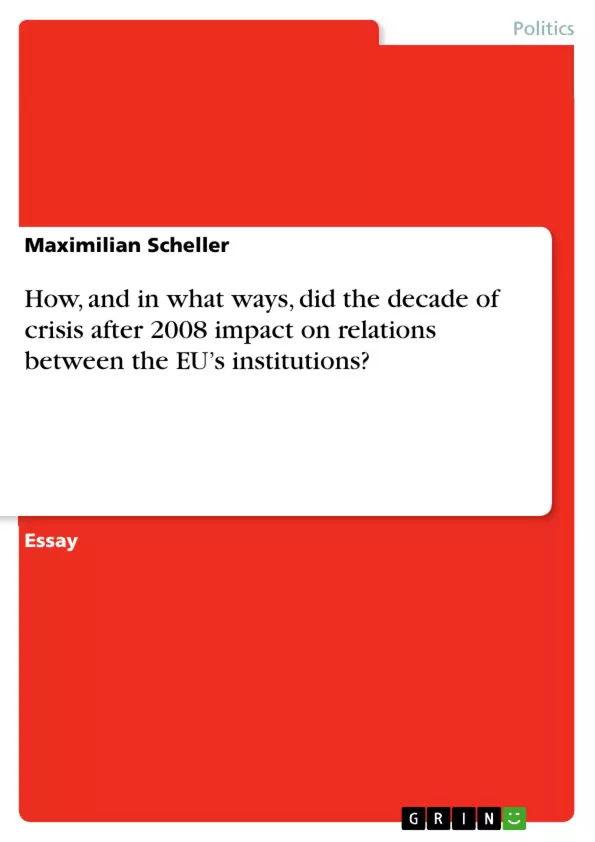This essay discusses the question, how the different crises impacted on the relations between the European Union’s institutions. The main purpose of this study is to develop an understanding of how the institutions changed during the decade of crisis itself and among themselves. In the following lines impact and change will be described on the example of the eurozone crisis. The paper first shed a light on the role of the European Parliament and how its position has been influenced. The second part is concerned with the European Commission, while thirdly, the role of the European Council will be considered. Fourthly, the role of the European Central Bank will be discussed and in what ways its position about the eurozone crisis let the supranational institution to power. In conclusion, the final chapter draws upon the entire topic and summarizes the discussed points.
“Crisis can also be blunt opportunities for supranational institutions to show leadership.” (Hodson and Puetter, 2019).
The institutions of the European Union play an important role in the maintenance of the construction of European politics. During their developments over the last decades they went through a number of changes, crises, and realignments. Especially in the last decade, these influences on the European Union have increased. Chiefly, in the growing economical and political European world, the decade of crisis has become a central issue for the European Union. Starting with the euro crisis, over to the Ukraine crisis, the refugee crisis, the democracy and confidence crisis with rising populism, and the Brexit dilemma – the so-called, multiple crises forced and force the European Union and its intergovernmental and supranational bodies to constantly face new challenges.
Inhaltsverzeichnis (Table of Contents)
- The Decade of Crisis: An Introduction
- The Impact of the Eurozone Crisis
- The European Parliament
- The European Commission
- The European Council
- The European Central Bank
- The Lisbon Treaty and the European Council
- Conclusion
Zielsetzung und Themenschwerpunkte (Objectives and Key Themes)
This essay examines how the decade of crisis after 2008 impacted relations between the EU's institutions. The primary goal is to analyze the changes within and between these institutions during this period, focusing particularly on the eurozone crisis as a case study.
- The shifting balance of power between the European Union's institutions during the crisis
- The influence of the eurozone crisis on the European Parliament's role and power
- The evolution of the European Commission's position and the implications for its role as a legislative initiator
- The rise of the European Council as a central decision-making body
- The impact of the crisis on the community method and the EU's supranational transformation
Zusammenfassung der Kapitel (Chapter Summaries)
- The chapter begins by introducing the concept of the decade of crisis and its significance for the EU. It highlights the different crises that the EU faced, such as the euro crisis, Ukraine crisis, refugee crisis, and the Brexit dilemma.
- This chapter focuses on the European Parliament's role during the eurozone crisis. It examines arguments regarding the parliament's limited influence and its perceived loss of power due to the shift towards executive powers within the EU.
- The chapter analyzes the European Commission's position during the eurozone crisis, exploring its role in implementing reforms, its potential decline in legislative power, and the challenges it faces in maintaining its role as a "guardian of the treaties."
- This chapter discusses the rise of the European Council as a central decision-making body during the eurozone crisis. It highlights the Council's impact on the community method and its growing role in defining strategic guidelines for the EU.
- This chapter examines the role of the European Central Bank during the eurozone crisis. It explores its influence on economic governance and its increasing power in relation to other EU institutions.
Schlüsselwörter (Keywords)
Key terms and concepts explored in this essay include: European Union institutions, eurozone crisis, decade of crisis, European Parliament, European Commission, European Council, European Central Bank, community method, intergovernmentalism, supranationalism, executive powers, legislative powers, balance of power, crisis management, institutional change.
Frequently Asked Questions
How did the eurozone crisis change the balance of power in the EU?
The crisis led to a shift towards executive powers, strengthening the role of the European Council and the European Central Bank while the European Parliament faced challenges to its influence.
What was the impact on the European Commission's role?
While the Commission remained the "guardian of the treaties," it faced a perceived decline in its legislative initiation power as strategic guidelines were increasingly set by the European Council.
How did the European Central Bank (ECB) gain power during the crisis?
The ECB took a leadership role in economic governance, using its supranational authority to stabilize the eurozone, which increased its power relative to other political institutions.
What is the "community method" in EU politics?
The community method refers to the traditional decision-making process involving the Commission, Parliament, and Council. The crisis highlighted a shift away from this towards more intergovernmental decision-making.
What other crises defined the "decade of crisis" after 2008?
In addition to the eurozone crisis, the EU faced the Ukraine crisis, the refugee crisis, rising populism (confidence crisis), and the Brexit dilemma.
- Quote paper
- Maximilian Scheller (Author), 2019, How, and in what ways, did the decade of crisis after 2008 impact on relations between the EU’s institutions?, Munich, GRIN Verlag, https://www.hausarbeiten.de/document/1193543


